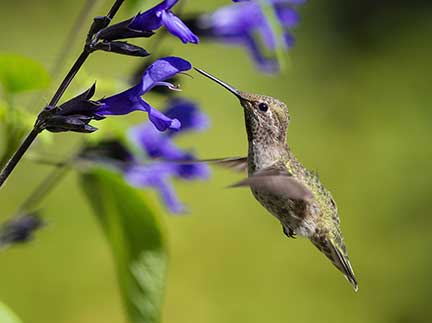 |
Previous Issues |
| Cedar Mill Community Website |
|
Search the Cedar Mill News: |
About The Cedar Mill News |
|
|||||||
| Volume 11, Issue 9 | September 2013 |
||||||
Previous article |
Next article |
|||
Amazing Hummingbirds!
|
||||
 |
| Anna's Hummingbird with Black and Blue Salvia. Photo ©2013 by Jeff Young |
When I have read about these amazing creatures in scientific journals, I am fascinated with their method of getting oxygen. Unlike humans, who breathe in and out- through the lungs, hummingbirds have a one-way flow of air. Air flows into the lungs and then circulates through some other air sacs—nine of them to be exact—to then be expelled out the nostrils but not via the lungs. This allows for richly oxygenated air to be constantly supplying the lung’s arteries with fuel for flight.
We have all seen hummingbirds in our area hover over flowers, fly backward (the only species of bird that can do this maneuver), do aerial gymnastics to fight off other hummers, and in general zip around our yards. We have two species in our area, with an occasional rarity showing up. Anna’s hummingbirds stay year round, but the Rufous hummers are only here in the summer months. If you are fortunate enough to go south, there are many species of hummingbirds in the American Southwest and in Mexico—some that vary greatly from the coloration of our two species, and some much larger or much smaller. Our two hummingbirds weigh about the same as a penny!
I am regularly asked about feeding hummingbirds. As with all animals, closer to natural and real food is probably healthier, so plant some nectar-rich plants. This year I found some blue-flowered plants at the Cedar Mill Farmers Market that I had never seen before, called “Black and Blue Salvia.” Amazingly the hummingbirds really like them. Generally I had heard that they prefer red, orange, or yellow flowers, and always before they did seem to prefer my fuchsias or the crocosmias, but this year the blue flowers are the more preferred food.
If you do choose to feed hummingbirds, make sure to clean the feeder really regularly. This is a time commitment, since in the hotter days the sugar water turns to vinegar within a day or two. Also mold grows rapidly, so use a small brush designed for feeders and scrub away. I personally don’t use bleach since I am not confident I can rinse it enough to not have some traces left. Hard scrubbing does the trick. Also most Audubon sites do not recommend the use of red colorings often found in commercial foods—according to some experts this is not good for bird liver function. I generally “saturate” the water with sugar, instead of using a specific recipe, but there are recipes on line.
Besides all the amazing science and function, hummingbirds are simply inspiring creatures. What lovely pieces of natural beauty, which inspire delight and joy when we see them. We are soon to say goodbye to our summer guests—the Rufous ones—ours were very prolific this year and are gathering now to fly south together. We must have at least six in our yard now drinking down the nectar in the feeder every day, putting on “weight” to fly the thousands of miles. Most winter in wooded areas in the Mexico state of Guerrero. Amazing hummingbirds indeed.
Lauretta Young MD is the Director of Integrative Self Care Initiative for Students at OHSU, but mostly loves to get outdoors to share the wonders of the natural world with others. See her web site at www.portlandbirdwatching.com . You can see her husband’s photos of wild places and creatures at www.flickr.com/photos/youngbirders
Previous article
![]()
Like us on Facebook for timely updates
Published monthly by Pioneer Marketing & Design
Publisher/Editor:Virginia Bruce
info@cedarmillnews.com
PO Box 91061
Portland, Oregon 97291
© 2013